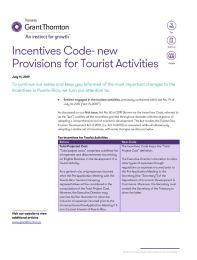-
Financial statements audits
Financial statement audits
-
Compliance audits
Compliance audits
-
Compilations and reviews
Compilations and audit
-
Agreed-upon procedures
Agreed-upon procedures
-
Tax compliance
Business Tax
-
Global mobility services
Through our global organisation of member firms, we support both companies and individuals, providing insightful solutions to minimise the tax burden for both parties.
-
Sales and use tax and indirect taxes
SUT/ VAT & indirect taxes
-
Tax incentives
Navigating the complex landscape of tax incentives in Puerto Rico can be challenging. Whether you're looking to benefit from the Export Services Act (Act 20), the Individual Investors Act (Act 22), or other incentives under Act 60, we provide tailored advice to help you maximize your tax benefits and ensure compliance. Let us help you unlock the potential of doing business in Puerto Rico.
-
Transfer Pricing
The laws surrounding transfer pricing are becoming ever more complex, as tax affairs of multinational companies are facing scrutiny from media, regulators and the public

-
Business consulting
Our business consulting services can help you improve your operational performance and productivity, adding value throughout your growth life cycle.
-
Business Risk Advisory
Risk is inevitable but manageable. We deliver relevant, timely and practical advices to aid organizations manage risk and improve business performance. We can help you identify, understand and manage potential risks to safeguard your business and comply with regulatory requirements.
-
Technology Advisory
We provide comprehensive solutions to safeguard your business and ensure operational resilience and compliance. Our expert team offers a range of technology advisory services designed to address your cybersecurity needs, enhance business continuity, and manage security effectively.
-
Transactional advisory services
Transactions are significant events in the life of a business – a successful deal that can have a lasting impact on the future shape of the organizations involved. Because the stakes are high for both buyers and sellers, experience, determination and pragmatism are required to bring deals safely through to conclusion.
-
Forensic and investigative services
At Grant Thornton, we have a wealth of knowledge in forensic services and can support you with issues such as dispute resolution, fraud and insurance claims.

To continue our series and keep you informed of the most important changes to the incentives in Puerto Rico, we turn our attention to:
- Entities engaged in the tourism activities, previously contained within Act No. 74 of July 10, 2010 (“Act 74-2010”).
As discussed on our first issue, Act No. 60 of 2019 (known as the Incentives Code, referred to as the “Act”) codifies all the incentives granted throughout decades with the objective of adopting a comprehensive tool of economic development. The Act revokes the Puerto Rico Tourism Development Act of 2010, (i.e. Act 74-2010) as amended, while simultaneously adopting a similar set of Incentives, with some changes we discuss below.
Tax Incentives for Tourist Activities
|
Act 74- 2010 |
New Code |
|
Total Projected Cost: “Total project costs” comprises a defined list of expenses and disbursements incurred by an Eligible Business in the development of a Tourist Activity. As a general rule, only expenses incurred after the Pre-Application Meeting with the Puerto Rico Tourism Company representatives will be considered in the computation of the Total Project Cost. However, the Executive Director may exercise his/her discretion to allow the inclusion of expenses incurred prior to the aforementioned Pre-Application Meeting if it is in the best interest of Puerto Rico.
|
The Incentives Code keeps the “Total Project Cost” definition. The Executive Director’s discretion to allow other types of expenses through regulations or expenses incurred prior to the Pre-Application Meeting to the Secretary (the “Secretary”) of the Department of Economic Development & Commerce. Moreover, the Secretary must consult the Secretary of the Treasury to allow the latter.
|
|
Mixed-use Developments: In the case of mixed-use developments, the Total Project Cost will include all the costs listed in the Act 74-2010, provided that at least 70% of the total project area is tourism development, without consideration of common elements of the project, for purposes of determining the Alternate Tourism Investment Tax Credits under Section 5(b) of the Act 74-2010. |
The Incentives Code eliminates the 70% mixed-use exception. |
|
Eligible Investment: For purposes of the Tourism Investment Tax Credits under Section 5(a), an “Eligible Investment” comprises:
For purposes of the Alternate Tourism Investment Tax Credits under Section 5(b), and “Eligible Investment” comprises:
The totality of the invested funds must be solely and exclusively used for the acquisition and development of tourism facilities to be considered as eligible investment. As a rule, only contributions made after the Pre-Application Meeting with the PR Tourism Company representatives will be considered in the determination of what constitutes an Eligible Investment. However, the Executive Director may exercise his/her discretion to allow investments made prior to the Pre-Application Meeting if it is in the best interest of Puerto Rico. |
The Incentives Code keeps the “Eligible Investment” definition from the Act 74-210. Moreover, it adds that “loans that are guaranteed by the Exempt Business or its assets” will be considered an Eligible Investment. Also, the Act clarifies that monies received from insurance policies and used in the project will not constitute an Eligible Investment. Nonetheless, it eliminates the portion of the definition that pertains to the Alternate Tourism Investment Tax Credits under Section 5(b).
|
|
Eligible Business: Any new or existing business not covered under any of the previous Tourism Development Acts, or an exempt business that surrenders its Incentives Resolution or Grant issued under previous Tourism Development Acts, in exchange for a Grant under Act 74-2010. |
Similar to the language of Act 74-2010, the Incentives Code will apply to a New or Existing business that is not covered under any of the previous Tourism Development Acts, or those that surrender their existing Grant. |
|
Tourism Activity: Ownership and/or Administration of:
|
The Incentives Code keeps the tourism activity definition from Act 74-2010 and adds “casino operations” and “eSports & Fantasy Leagues” as Eligible Businesses. |
|
Income Tax: Tourism Development Income (“TDI”) and distributions from said income benefit from an income tax exemption of up to 90%. The remaining 10% is subject to the applicable tax rates under the Puerto Rico Internal Revenue Code, as amended (the “PRIRC”). |
The Incentives Code eliminates the 90% exemption and instead establishes a flat 4% tax rate on TDI. Also, adds a section on the exempt nature of distributions from TDI’s E&P.
|
|
Flexible Exemption: Exempt Business may elect to suspend the application of the Income Tax exemption for a particular year by including a notice to that effect on its income tax return for said taxable year. Even with this suspension, the total number of years that an exempt business may enjoy the exemption cannot exceed 10 years. |
No changes, though the exemption period is longer under the Incentives Code (as we note below).
|
|
Royalty Income: Royalty Income is subject to 12% tax rate. |
No changes |
|
Property Tax: Property used in the Exempt Business is afforded a 90% exemption on real and personal property taxes. |
Exemption is reduced to a 75% tax exemption. |
|
Municipal License Taxes: Act 74-2010 provides an exemption from municipal licenses fees, excise and other taxes that will depend on whether the Exempt Business is new (100% exemption) or existing (90% exemption). |
Exemption is reduced to a 50% tax exemption for both new and existing businesses. |
|
Sales & Use Taxes: Up to 100% exemption from sales and use taxes with respect to items acquired and used by the Exempt Business in relation to the Tourist Activity. |
No changes |
|
Construction Excise Tax: Up to a 100% exemption on any tax, levy, fee, license, excise tax, rate, or charge for the construction of works to be devoted to a tourist activity within a municipality. |
Exemption is reduced to a 75% tax exemption. Changes the formula to determine amount to be taken as exemption in the case of condo hotels, specifically in the annual reduction of the exemption applicable to certain units from 240 months to 180 months. |
|
Fuel Exemption: 100% exemption from excise taxes on crude oil, and other hydrocarbons mixture used by the Exempt Business. |
No changes |
|
Commencement of Exemption Period:
|
No changes |
|
Postponement of Commencement Dates: Exempt Business may postpone the commencement of the exemption period for up to 36 months. |
No changes |
N/A |
New sectionTax Exemption Requirements: The Incentives Code states that every tourism project be evaluated upon the following criteria:
The Secretary of the Department of Economic Development and Commerce is solely responsible for the Exempt Business’ compliance with these eligibility requirements. Moreover, it is his/her responsibility to establish a formula that can quantify the above referenced requirements’ in relation to the Cash Grant and subtract the corresponding portion for those requirements that were not met by the Exempt Business. |
|
Transfer of Exempt Business: As a rule, the transfer of an Exempt Business must be approved by the Executive Director. However, the Executive Director may retroactively approve any transfer made without his/her approval when the circumstances of the case warrant such approval. |
Instead of notifying the Executive Director, the transfer of a majority of the stock or proprietary interest in the Exempt Business will now need to be notified to the Department of Economic Development and Commerce. |
|
Interrelation with Other Laws: The provisions of the Act 74-2010 cannot not be used jointly with other tax incentives laws in such a manner that the joint application of both laws causes the obtainment of benefits that exceed those to which a Petitioner would be entitled under any of the laws applied individually. |
The Incentives Code retains the prohibition against the colloquially known “double dipping” but it includes an exception for benefits under sections 3010.01 (Tax Credit for Touristic Investment) and 5010.01 (Economic Incentives Funds).
|
|
Waiver & Other Exemptions: Section 11 of Act 74-2010 waives the requirement of a personal property leasing license, as required under Act 20-1973, to lessees who lease personal property to exempt businesses. Also, the Act provides a 90% percent exemption from the payment of internal revenue, legal aid, or any other stamps required by law or regulation for the execution, issue of any certified copy, submittal, registration, and any other operations at the Property Registry; and tariffs, levies, taxes, and fees for its submittal, registration and any other operations at the Property Registry. |
Includes “cancellations of mortgages” under the definition of “real or contractual right that do not have access to property registration”. |
|
Tax Credits: As noted above, the Act 74-2010 allows for the concession of Tourism Investment Tax Credits under Section 5(a) and Alternate Tourism Investment Tax Credits under Section 5(b). Credits under 5(a): 50% of the Eligible Investment
Alternate Credits under 5(b): 40% of Eligible Investment
30% of Eligible Investment
|
The Incentives Code dispenses with the 50% tax credit but maintains the 30 and 40% alternatives. The maximum amount of tax credit for tourist investment will be 30% or 40% of the total project cost. Adds that the date of commencement of operations must be made under sworn declaration filed within 90 days of commencement of operations. Establishes the order of usage of proceeds from the sale of tax credits for tourist investment, as well as the manner of disposition of such credits. Further confirms that the ownership of the tax credits granted under the Code will belong to the Exempt Business, not the Investors.
|
|
Term of Tax Exemption Decree: 10 years
|
Increases exemption period to 15 years. |
|
Extension of Tax Exemption Decree: The 10-year exemption period can be extended for an additional 10 years. |
Increases extended period to an additional 15 years. |
|
Renegotiation of Tax Exemption Decree: Any Exempt Business under the 1993 Tourism Development Act can request the renegotiation of its Tax Exemption Decree to avail itself of the benefits under the Act 74-2010 if:
A renegotiated Tax Exemption Decree will last for the established 10-year period. |
The Incentives Code will allow for the renegotiation of Tax Exemption Decree, but the requirements and provisions for said renegotiation will be consigned in the Regulations to the Code. |
|
|
Tax Decrees under Act 74-2010: Applications for tax incentives under Act 74-2010 will be accepted until December 31, 2019. |
The Act is mainly effective from July 1, 2019. Changes incorporated by the Act will not affect current grantee holders. Applicants may elect to file under previous laws or under the Act until December 31, 2019. Commencing on January 1, 2020, all applications will have to be submitted under the Act. However, the Secretary of the DEDC may implement by regulation provisions of the Act before January 1, 2020 to further the objectives of the Act.
Stay tuned for our next alert on the series regarding the noteworthy changes to the tax incentives for medical professionals and young entrepreneurs.
Please contact our Tax Department should you require additional information regarding this or any other tax issue. We will be glad to assist you.

